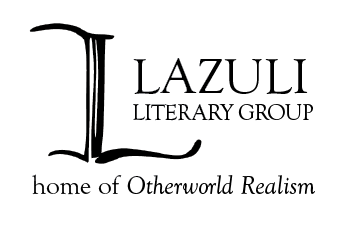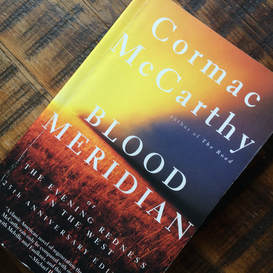- ABOUT
- CONTESTS
-
AZURE: A Journal of Literary Thought
- AZURE Volume 8 >
- AZURE Volume 7, Issue 3 >
- AZURE Volume 7, Issue 2 >
- AZURE Volume 7, Issue 1 >
- AZURE Volume 6, Issue 4 >
- AZURE Volume 6, Issue 3 >
- AZURE Volume 6, Issue 2 >
- AZURE Volume 6, Issue 1 >
- AZURE Volume 5, Issue 4 >
- AZURE Volume 5, Issue 3 >
- AZURE Volume 5, Issue 2 >
- AZURE Volume 5, Issue 1 >
- AZURE Volume 4, Issue 4 >
- AZURE Volume 4, Issue 3 >
- AZURE Volume 4, Issue 2 >
- AZURE Volume 4, Issue 1 >
-
ARCHIVES: VOLUME 3
>
-
ARCHIVES: VOLUME 2
>
-
Archives: Volume 1
>
- Literature Courses
- SUBMISSIONS
- BLOG
- Lazuli Reading Series
- Literary Links
"...a howl of such outrage as to stitch a caesura in the pulsebeat of the world." Blood Meridian is a gentle, rhythmic scraping of the inner maw of a universal wisdom. This wisdom (personified most literally in the dark character of the "judge" but present as an undercurrent mist everywhere else) girds the prose - which is delicate and waltzing - and renders profound the violence and the depravity, the human wickedness and the horror that, without McCarthy's thoughtful hand, might have left us merely a residue of the nightmares of the American West of 1848, a story of "itinerant degenerates bleeding westward like some heliotropic plague". "I ain't heard no voice, he said. It is precisely the nightmarish, colorful quality of the gore contained herein that had me resist the reading of this book that sat on my shelf for over two years; a book whose spine I awoke to every morning amidst the blur of Dickens and Woolf, who might never have guessed that their particular worlds of struggling Victorianism might be slotted unceremoniously alongside this roiling, described "neo-Biblical" tale of a scalping, excrementary world. And yet... the beauty contained in this book rivals the beauty contained anywhere. Take this fanciful description of a massacre of mules: "... the animals dropping silently as martyrs, turning sedately in the empty air and exploding on the rocks below in startling bursts of blood and silver as the flasks broke open and the mercury loomed wobbling in the air in great sheets and lobes and small trembling satellites and all its forms grouping below and racing in the stone arroyos like the imbreachment of some ultimate alchemic work decocted from out the secret dark of the earth's heart, the fleeing stag of the ancients fugitive on the mountainside and bright and quick in the dry path of the storm channels and shaping out the sockets in the rock and hurrying from ledge to ledge down the slope shimmering and deft as eels." There is the cradling of puppies - one in each hand - drowned in a river and shot by pistols for the mere sport of a deadened spirit; but then there is the gentle sniffing of horses through the precisely described foliage of the mountain terrain. Each is described in gentle, rolling prose, without crescendo and without warning; at times, without punctuation. An extreme quietness overtakes the tale throughout, the ravages of battles equal to the spindrifts of the breathtaking desert landscapes, of silent lightning that "rigged a broken lyre upon the world's dark rim" and of "secular aloes blooming like phantasmagoria in a fever land". Even in the harshness of the landscape, the enemy of man, there is awe in McCarthy's pen: "the cannonballs were solid copper and came loping through the grass like runaway suns"; "the hail leaped in the sand like small lucent eggs concocted alchemically out of the desert darkness." If words are colors, then McCarthy excavates a palette with a wider range of pigments than can be counted in the gossamerity of a fly's wings. One feels the confidence in the descriptions that McCarthy's desire does not exceed his grasp, for he has available to him such a storehouse of vocabulary that one must assume that he has described every iota of every landscape exactly as he must have intended. "They moved like migrants under a drifting star and their track across the land reflected in its faint arcature the movements of the earth itself. To the west the cloudbanks stood above the mountains like the dark warp of the very firmament and the starsprent reaches of the galaxies hung in a vast aure above the riders' heads." I had nearly quit the book early, fearing that the beauty of the prose would lull me into a state of complacency with the violence - I found untenable the thought of being made to *enjoy* these trenchantly described horrors. I feared that no character, though each suffers, would draw my sympathy and therefore I would read the novel without heart; for each character in Blood Meridian suffers, but each in turn causes unabashed suffering. But somehow, evident even a few pages in, there is a softness and a generosity in the treatment of these souls that manages to equalize the humanity of both sufferer and suffered: "... they listened to their breathing in the dark and the cold and they listened to the systole of the rubymeated hearts that hung within them." What furnishes the gravitas of the book throughout is McCarthy's resistance to ending a sentence, to beginning with the physical and ending with the mystical. He stitches pathways between worlds where our minds tend to roam only in one or the other: from "turds of goats" to "shapes capable of violating their covenant with the flesh that authored them": "In the days to come they would ride up through a country where the rocks would cook the flesh from your hand and where other than rock nothing was. They rode in a narrow enfilade along a trail strewn with the dry round turds of goats and they rode with their faces averted from the rock wall and the bakeover air which it rebated, the slant black shapes of the mounted men stenciled across the stone with a definition austere and implacable like shapes capable of violating their covenant with the flesh that authored them and continuing autonomous across the naked rock without reference to sun or man or god." Or the opposite - the corporealizing in an instantly recognizable image a pattern of human relations as old as a son and his deceased father. "He will not see him struggling in follies of his own devising... He is broken before a frozen god and he will never find his way." What becomes patently clear is the humanity that is thrust under the fabric of the characters and their actions; a humanity that breathes in and out slowly throughout the course of a book, and you realize that the thing upon which you repose is grander than you thought, and your vision smaller - what you sit upon is a warm, heaving chest and it has been breathing under you always, and you carried along with it with your comrades, every one of you a piece of the general fabric among which humanity is disseminated. "Everbody don't have a reason to be someplace. The deeper into the (often very literal) darkness that McCarthy leads you, you expect to suffocate. But suffocate you do not! Because you feel not that you have been taken out of the world - not that you have been denied - but that you have been taken into it and a certain thing that is not amorphous but is hard has been revealed to you. "About the fire were men whose eyes gave back the light like coals socketed hot in their skulls and men whose eyes did not, nbut the black man's eyes stood as corridors for the ferrying through of naked and unrectified night from what of it lay behind to what was yet to come." "...drove forth the last fragile race of sparks fugitive as flintstrikings int he unanimous dark of the world." "If much in the world were mystery the limits of that world were not, for it was without measure or bound and there were contained within it creatures more horrible yet and men of other colors and beings which no man has looked upon and yet not alien none of it more than were their own hearts alien in them, whatever wilderness contained there and whatever beasts." There is revealed, in effect, *more* in which to breathe, and more sympathy and beauty and despair to be found than could have been thought possible. "Sparse on the mesa the dry weeds lashed in the wind like the earth's long echo of lance and spear in old encounters forever unrecorded." By Sakina B. Fakhri
2 Comments
|
AuthorThe Lazuli Editors, heightening the perception of the magical. Archives
March 2019
Categories
|
© Lazuli Literary Group 2022 | [email protected] | 847.970.2506
Illustrations & Logo by Evgenia Barsheva
As an affiliate of Bookshop.org, Lazuli Literary Group earns a small commission on sales made via any associated links on our website.
Illustrations & Logo by Evgenia Barsheva
As an affiliate of Bookshop.org, Lazuli Literary Group earns a small commission on sales made via any associated links on our website.


 RSS Feed
RSS Feed